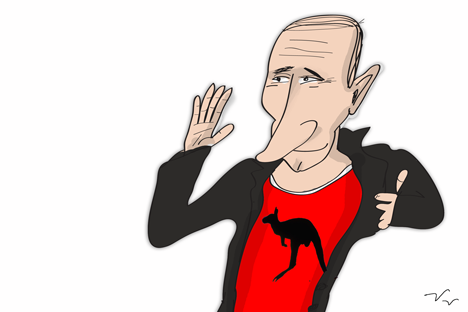
Click to enlarge the cartoon. Drawing by Niyaz Karim
President Vladimir Putin stressed at the final press conference at this month’s G20 summit in Brisbane that “the work took place in a very constructive atmosphere and was productive”. Important agreements were reached, in particular on increasing by 2pc the average rate of growth of the G20 economies by 2018, which should boost the world economy by $2trillion. Decisions were also made on fighting unemployment, improving financial and tax regulations, reforming international energy institutions and improving co-ordination on infrastructure projects.
The Australian chairmanship focused on promoting private-public partnership. Such partnership is increasingly common in Russia. The decision to create a global infrastructure hub was significant: it is assumed such a structure will make it possible to share best practice and experiences. Russia, which is already implementing a number of large-scale infrastructure projects, is willing to participate directly in this work.
Unfortunately there was a lack of progress on reform of the global financial system, in particular of the International Monetary Fund. It is no secret that the chief reason for delays in bringing about the reforms approved in 2010 was and still is the position of the United States. Such an attitude to agreed commitments as well as any attempts to politicise the work of this forum undermines confidence in it.
The meeting of Brics leaders just before the G20 summit is now a tradition. In our view, this is a very good and useful practice. Such meetings make it possible to better co-ordinate the Brics states’ approaches to issues related to world trade and the financial system as well as to determine how best to react to contemporary challenges in these areas. The G7 also engages in such co-ordination.
President Putin held a series of bilateral meetings with his counterparts in Brisbane, in which the subject of Ukraine dominated the discussions. The president outlined the well-known Russian approaches towards the settlement of Ukraine’s internal crisis and his partners expressed their own assessments.
In general, as Mr Putin noted, the conversations were both frank and constructive. The topic of Ukraine was not discussed during the course of the official business of the summit, which, however, served as a platform for the much-needed dialogue.
We are convinced that the G20 must continue being a mechanism for global crisis response and co-ordination of collective decisions of a financial and economic nature and that it must not become a place for political squabbles. This is especially so since the crisis remains a reality – whether you call it the “new normal” or the “new mediocre”. The leaders of various countries, including Prime Minister David Cameron, correctly point to the threat of a new wave of global crises.
The so-called geopolitical risks, which can be created artificially, as in Ukraine, are exacerbating the situation. As John Mearsheimer, professor of political science at the University of Chicago, wrote in Foreign Affairs, the EU-Ukraine Association Agreement, “far from being routine, sounds like a back door to Nato membership”.
And the American diplomat Richard Haass likewise notes that “Russia could have been asked to join Nato, which would have little military difference.” As a result, the immense potential for co-operation between Russia and the European Union has not materialised. Interdependence means that we either win together or we lose together.
This is why the recent summit leads to the conclusion that the old geopolitics is especially costly in the crisis conditions. It is necessary to choose between it and the interests of development, which have rightly moved to the top of today’s international agenda.
Alexander Yakovenko is Russian Ambassador to the United Kingdom. He was previously Deputy Minister of Foreign Affairs.
All rights reserved by Rossiyskaya Gazeta.
Subscribe
to our newsletter!
Get the week's best stories straight to your inbox